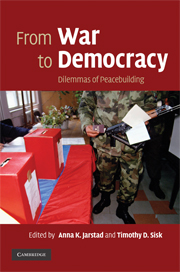Book contents
- Frontmatter
- Contents
- List of tables
- About the authors
- List of acronyms
- Acknowledgments
- Introduction
- Part I The perils of war-to-democracy transitions
- Part II The security context
- 2 Peacekeeping and democratization
- 3 Violence in war-to-democracy transitions
- Part III The political process
- Part IV International engagement
- References
- Index
2 - Peacekeeping and democratization
Published online by Cambridge University Press: 14 May 2010
- Frontmatter
- Contents
- List of tables
- About the authors
- List of acronyms
- Acknowledgments
- Introduction
- Part I The perils of war-to-democracy transitions
- Part II The security context
- 2 Peacekeeping and democratization
- 3 Violence in war-to-democracy transitions
- Part III The political process
- Part IV International engagement
- References
- Index
Summary
The international community has endeavored to maintain peace and foster stable, democratic polities in a host of war-torn countries since the end of the Cold War. A primary tool in this effort has been the practice of international peacekeeping – the deployment of international personnel, generally under the auspices of the United Nations or regional organizations, to oversee the transition from war to peace. Maintaining peace in the aftermath of civil war is difficult enough, but the added task of shepherding a country toward democracy is fraught with challenges and dilemmas. States recently torn asunder by warfare do not provide particularly fertile ground for the growth of democracy. Nor is peacekeeping, on the face of it, an especially powerful tool. Peacekeeping missions are habitually under-funded, under-equipped, and understaffed. They are cobbled together, often at the last minute, with begged-for personnel (among whom there may be no common language). They are often given unrealistically short mandates and overly ambitious time-lines and benchmarks. And they are asked to perform miracles, turning countries in which political institutions, economic infrastructure, and the very fabric of society have all been devastated by civil war into stable, functioning, democratic states.
This chapter assesses how well they do at accomplishing this virtually impossible task. More specifically, what role does international peacekeeping play in the democratization of post-war societies? It shows that peacekeeping has neither a clear positive nor a clear negative effect on democratization.
- Type
- Chapter
- Information
- From War to DemocracyDilemmas of Peacebuilding, pp. 39 - 79Publisher: Cambridge University PressPrint publication year: 2008
- 25
- Cited by



